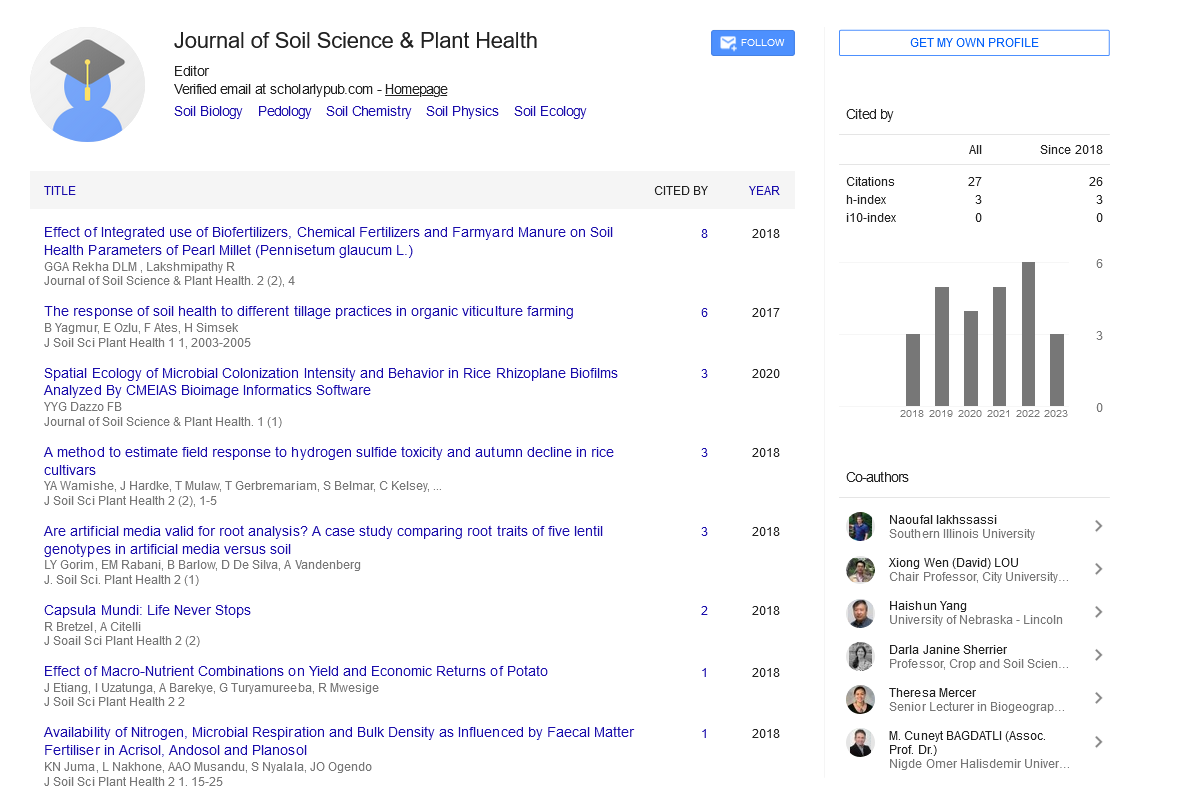Perspective, Vol: 7 Issue: 1
Unleashing the Power of Agricultural Soil Science: Optimizing Soil Health for Sustainable Crop Production
Vilim Filipovi*Department of Soil Amelioration, Division for Agroecology, University of Zagreb, 10000 Zagreb, Croatia
*Corresponding Author: Vilim Filipovi
Department of Soil Amelioration
Division
for Agroecology
University of Zagreb
10000 Zagreb, Croatia
E-mail: vlimficvic@agr.hr
Received date: 27 January, 2023, Manuscript No. JSPH-23-96252;
Editor assigned date: 30 January, 2023; PreQC No. JSPH-23-96252(PQ)
Reviewed date: 14 February, 2023; QC No. JSPH-23-96252;
Revised date: 21 February, 2023; Manuscript No. JSPH-23-96252(R);
Published date: 28 February, 2023, DOI:10.4172/jsph.10000179
Citation: Filipovi V (2023) Unleashing the Power of Agricultural Soil Science: Optimizing Soil Health for Sustainable Crop Production. Adv Biomed Res Innov 6:1.
Description
Pedology, also known as soil science, is a multidisciplinary field that studies the formation, classification, distribution, and properties of soils. Soils are crucial components of the Earth's ecosystem, serving as the foundation for agriculture, forestry, and natural ecosystems. In this manuscript, we delve into the intricacies of pedology, exploring its history, methods, and key findings. We highlight the significance of soil as a finite resource, and discuss the role of pedology in sustainable land management and conservation. Pedology plays an important role in sustainable land management and conservation. Sustainable soil management practices, such as conservation.
Soil is a complex and dynamic mixture of minerals, organic matter, water, air, and living organisms. It is the result of a long and intricate process involving physical, chemical, and biological weathering of rocks, as well as the interaction between climate, topography, and vegetation. Pedology, derived from the Greek word "pedon" meaning soil, is the scientific study of soils and their properties. It encompasses various disciplines such as geology, chemistry, biology, agronomy, and ecology, making it an interdisciplinary field.
The origins of pedology can be traced back to ancient civilizations that recognized the importance of soils for agriculture. Chinese, Indian, and Roman scholars were among the first to document observations on soil properties, fertility, and management practices. However, modern pedology as a formal scientific discipline emerged in the late 19th and early 20th centuries with the pioneering work of soil scientists like Vasily Dokuchaev, who is often considered the "father of pedology." Dokuchaev's concept of soil forming factors and soil horizons laid the foundation for the systematic study of soils.
Pedologists use a variety of methods to study soils. Field observations, soil sampling, and laboratory analyses are key techniques employed in pedological research. Field observations involve the visual examination of soil properties such as color, texture, structure, and drainage. Soil sampling involves collecting soil samples from different depths and locations to analyze their physical, chemical, and biological properties. Laboratory analyses include tests for soil texture, nutrient content, pH, and microbial activity, among others. Pedologists also use advanced techniques such as remote sensing, isotopic analysis, and molecular biology tools to study soils at a molecular and microscopic level.
Pedological research has provided invaluable insights into the complexity and diversity of soils. One key finding is the recognition of soil as a non-renewable and finite resource. Soil formation is a slow process that takes centuries to millennia, and soil erosion caused by human activities such as deforestation, intensive agriculture, and urbanization can deplete soils faster than they can form. Pedologists have also discovered the critical role of soils in supporting plant growth and regulating water and nutrient cycles. Soils provide essential ecosystem services such as nutrient cycling, water filtration, and habitat for countless microorganisms that are essiential for plant growth and ecosystem health.
Soil classification is an important aspect of pedology that helps in organizing and understanding the diversity of soils. Various systems of soil classification have been developed over the years, such as the USDA Soil Taxonomy, the World Reference Base for Soil Resources, and the FAO soil classification system. These systems categorize soils based on their physical, chemical, and biological properties, and provide a framework for describing, mapping, and managing soils. Soil classification is essential for land use planning, crop suitability assessment, and environmental monitoring.
 Spanish
Spanish  Chinese
Chinese  Russian
Russian  German
German  French
French  Japanese
Japanese  Portuguese
Portuguese  Hindi
Hindi 